
Membury is a village three miles north west of Axminster in East Devon district. The population at the 2011 Census was 501.
Bowden is a historic estate in the parish of Yealmpton in Devon, England. From the 15th century until 1748 the manor house was for eight generations the seat of a junior branch of the Copleston family of Copleston. The manor house was largely rebuilt in the 19th century and, together with some of its outbuildings, now serves as a farmhouse.
Sir Richard Reynell, of Pitney in the county of Somerset, Sheriff of Devon in 1191-4, was a knight who lived during the successive reigns of Kings Henry II (1154-1189), Richard I (1189-1199) and John (1199-1216).

Sir Thomas Wise, KB, of Sydenham in the parish of Marystow and of Mount Wise in the parish of Stoke Damerel in Devon, was Sheriff of Devon in 1612 and in 1621 served as a member of parliament for Bere Alston in Devon.
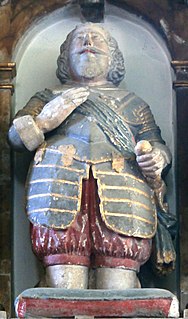
Sir William Strode (1562–1637) of Newnham in the parish of Plympton St Mary, Devon, England, was a member of the Devon landed gentry, a military engineer and seven times a Member of Parliament elected for Devon in 1597 and 1624, for Plympton Erle in 1601, 1604, 1621 and 1625, and for Plymouth in 1614. He was High Sheriff of Devon from 1593 to 1594 and was knighted in 1598. In 1599 he was appointed Deputy Lieutenant of Devon. There is a monument to him in the parish church of Plympton St Mary.

Roborough is a village and civil parish 5.5 mi (8.9 km) from Great Torrington. Situated topographically on the plateau between the Torridge and Taw Rivers, the parish covers 1,258 ha and contains a population of some 258 parishioners. It is surrounded by a pastoral landscape of rectangular fields, high hedges and scattered farmsteads.

Whympston, in the parish of Modbury in Devon, England, is a historic manor. In the 12th century it became the earliest English seat of the prominent Norman family of Fortescue, influential in British and West Country history, which survives today as Earl Fortescue, seated at Ebrington in Gloucestershire, but until recently seated at Castle Hill and Weare Giffard in Devon.
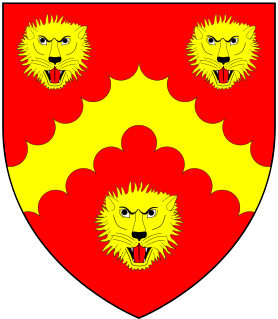
John Peryam, of Exeter, Devon, was elected four times as a Member of Parliament, for Barnstaple 1584, Bossiney 1586, Exeter 1589 and 1593. He served as Mayor of Exeter. He was the younger brother of Sir William Peryam (1534-1604) of Little Fulford, near Crediton in Devon, Lord Chief Baron of the Exchequer.

Sir William Huddesfield of Shillingford St George in Devon, was Attorney-General to Kings Edward IV (1461–1483) and Henry VII (1485–1509). He built the tower of St George's Church, Shillingford.

Bableigh is an historic estate in the parish of Parkham in North Devon, England. It is separated from the village of Parkham by the Bableigh Brook. It was the earliest recorded seat of the Risdon family in Devonshire, from which was descended the Devon historian Tristram Risdon.

West Ogwell is a village and former civil parish and manor in Devon, England, located 2 miles south-west of the town of Newton Abbot and 1 mile west of the village of East Ogwell. It is now in the civil parish of Ogwell, administered by Teignbridge District Council. The church and manor house "lie hidden away on their own".
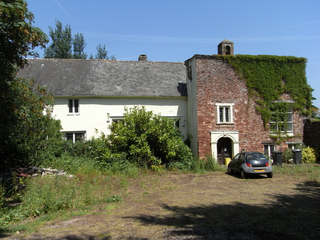
Blagdon historically in the parish of Paignton in Devon, England, is an historic manor, the seat of the Kirkham family from the 13th to 17th centuries. The manor house known as Blagdon Manor (House) survives as a grade II* listed building about two miles west of the historic centre of the town of Paignton, situated behind the "Blagdon Inn" public house, and almost surrounded by the "Devon Hills Holiday Park" of caravans and mobile homes, set-back at the end of a short driveway off the A385 Paignton to Totnes road. The settlements or farms of Higher Blagdon, Middle Blagdon and Lower Blagdon are situated to the north of the manor house.
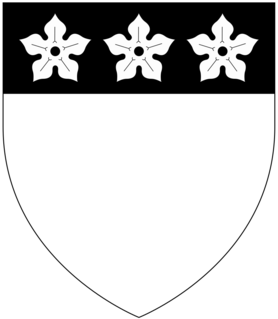
Ambrose Bellot, of Downton in Devon was a Member of Parliament for East Looe in Cornwall in 1597.

Milton Abbot is a village, parish, and former manor in Devon, 6 miles (9.7 km) north-west of Tavistock, Devon, and 6 miles (9.7 km) south-east of Launceston, Cornwall.
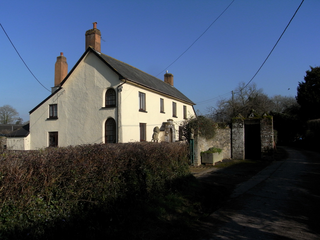
Moor Hays is a historic estate in the parish of Cullompton in Devon, England. It is stated incorrectly to be in the nearby parish of Burlescombe in Tristram Risdon's Survey of Devon. The estate is not to be confused with Moor Hayes in the parish of Washfield, about 3 miles north-west of Tiverton, another ancient farmstead, which since 2005 has been the site of a large housing estate named "Moorhayes".

Sir John Kirkham (1472–1529) of Blagdon in the parish of Paignton, Devon, was Sheriff of Devon in 1523/4. He was one of the Worthies of Devon of the Devonshire biographer Prince (d.1723), who called him a "very free and liberal, ... prudent and discreet" benefactor of the town of Honiton in Devon.

Walter Reynell of Malston in the parish of Sherford, Devon, was a Member of Parliament for Devon in 1454/5.

John Reynell was a Member of Parliament for Devon in 1427/28.

Speccot is an historic estate in the parish of Merton in Devon, England. It was the seat of the de Speccot family, one of the oldest gentry families in Devon, which founded almshouses at Taddiport, near Great Torrington, Devon, in the 13th century. It is situated about one mile south-west of Potheridge, the seat of the Monck family from before 1287 to the late 17th century, who were thus close neighbours of the de Speccot family for many centuries. The present farmhouse known as "Speccot Barton" is Victorian and although no obvious traces of an earlier house survive, is marked "On Site of a Mansion" on the First Edition Ordnance Survey 25 inch map of 1880-99. The estate is today operated as a family-run sheep farm with six holiday cottages to let. A smaller house known as "Little Speccot" is situated on the approach lane to Speccot Barton.
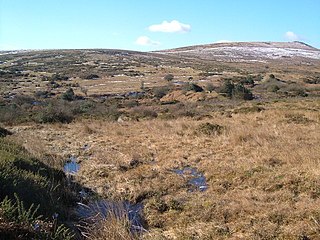
Bagtor is an historic estate in the parish of Ilsington in Devon, England. It was the birthplace of John Ford (1586-c.1639) the playwright and poet. The Elizabethan mansion of the Ford family survives today at Bagtor as the service wing of a later house appended in about 1700.


















